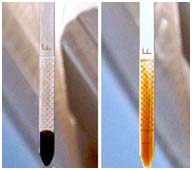Importance of an Oil Change
The purpose of motor oil and oil changes is to keep the many metal parts in your engine separated from each other, so they don't scrape together creating friction and causing damage. Motor oil is the life blood of your engine and it gets dirty. This is normal. The problem is that condensation, fuel and soot get into the oil and interferes with its effectiveness. Engine oils are designed to cope with this for a limited length of time called the "oil change interval." Your Owner's Manual will tell you the correct interval for your vehicle. If you're not sure, or want to play it safe by taking precautions, it is suggested that every 4,000 to 6,000 miles or every four months is a safe default guide. Old oil loses its ability to retain all that dirt and drop off the excess contaminants, which then begin covering the engine's parts with a gritty, gummy paste or sludge. Sludge accelerates engine wear. An oil change, performed on time, drains out the gunk along with the old oil. Failure to change your oil on a regular basis is considered abuse of your vehicle's maintenance. Most engines can tolerant some degree of abuse up to a 10,000-mile interval without catastrophic motor failure, even if the engine accumulates some sludge as a result.

Time to Change that Dirty Oil
When some people check the oil on their dipstick and see that the oil is dark, they think, "Wow, I really need an oil change!" Not necessarily, because most engine oils today have detergent in them to clean your engine as it lubricates internal moving parts. The dark oil is actually contaminates suspended in the oil itself so that it will not build up on your engine. The problem occurs when your engine is thousands of miles overdue for an oil change. Engine oil was only designed to contain a certain amount of dirt, soot, and other contaminates, then the junk starts to collect on your engine. If you're not sure when your vehicle needs an oil change, just check your owner's manual or call the dealer.
 The "W" in 5W-30 Oil Stands for "Weight", Right?
The "W" in 5W-30 Oil Stands for "Weight", Right?
No, it stands for winter, viscosity grade is a measure of the oil's flow characteristics or thickness at certain temperatures. The low-temperature viscosity, the number 5 in 5W-30 oil, indicates how quickly an engine will crank in winter temperatures and how well the oil will flow to lubricate critical engine parts. The lower the number, the easier it will be for the engine to start in cold temperatures. The high-temperature viscosity (the number 30 in 5W-30 oil) provides thickness for good lubrication at operating temperatures. 5W-30 oil provides good flow capability for cold weather, but it still retains thickness for high-temperature lubrication. Why is any of this important? If the oil in your engine is too thin in the summer, your engine will start, but you will probably hear a knocking sound and a tremendous amount of noise. You should always refer to your Owner's Manual to select the proper viscosity oil for your vehicle.

My Oil Light Never Came On. I Don't Understand Why My Engine Blew Up!
Do not wait for your oil light to come on to check your oil level. By then it may be too late. There is a possibility that the light may not be working properly and you will end up with an engine breakdown.
Oil Additives
"If I add engine oil additives to my engine, will it help my car run better?" Not really, because today's motor oil already has additives included in it before you buy it. If you add "extra" additives to your oil, you are actually diluting the motor oil, thinning it out, and possibly reducing the oil's effectiveness. More importantly, adding oil additives to some engines may possibly cause engine damage and/or void the manufactures warranty.

Be Aware of Products that Make Claims to Stop Oil Leaks & Engine Smoke.
Think about it, how can oil stop an oil leak? It can't! All you are buying is oil with a thicker viscosity. The only thing that can stop your oil leak is for you to replace the worn seal or gasket. The same rule applies to the engine smoke. A number of things can cause your vehicle to use excessive oil and/or release smoke from the tail pipe. Most likely, the cure will involve internal engine repair. Please don't fall for these product scams.





